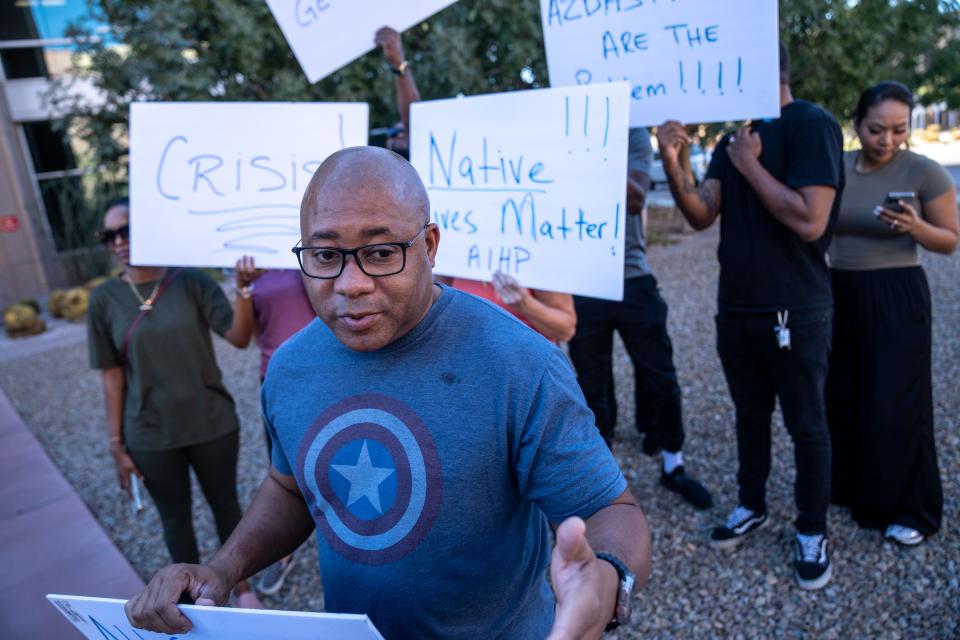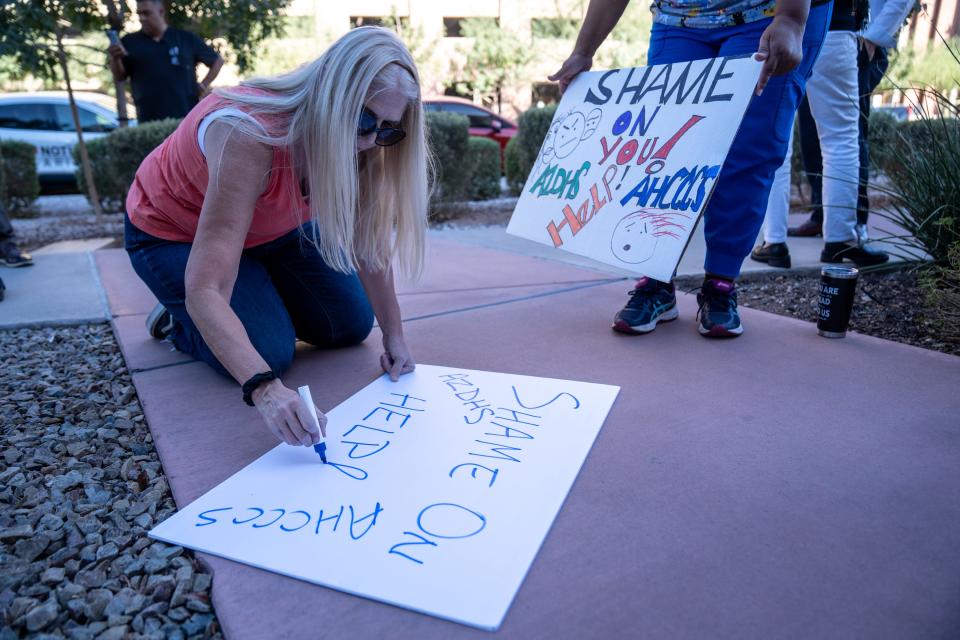Critics say AZ's Medicaid fraud crackdown hurt legitimate providers, caused homelessness
- Oops!Something went wrong.Please try again later.
A statewide crackdown on massive Medicaid fraud has resulted in job loss, a new wave of homelessness, and some people not getting the treatment for substance use disorder that they need, some critics say.
"No one is condoning bad actors, nobody," said André Miller, a pastor, mayoral candidate and behavioral health provider from Mesa who, on Tuesday, organized a small protest outside the Arizona Department of Health Services.
"You have people in the streets now who are relapsing, which is counter to what the state should want. They should want to help and not harm. ... And you have good people who want to help and serve and they are not being allowed to at this point."
Between 15 people and 20 people gathered in front of the state health department to protest what they say is an overzealous punishment system against Arizona outpatient clinics that offer rehabilitation for substance use disorder and other behavioral health problems. Miller said the group plans to protest outside of the state’s Medicaid program, the Arizona Health Care Cost Containment System, at a future date.
Several providers spoke about being forced to fire employees because payments from the Arizona Health Care Cost Containment System were either suspended or delayed because of extra checks and balances the agency put in place to prevent more fraud.
More on Arizona Medicare: Demand for mental health care is up, but many AZ providers don't take insurance
Investigators have said the scam primarily targeted indigenous Arizonans through the AHCCCS American Indian Health program, which allows providers to bill AHCCCS directly as fee-for-service rather than to managed care organizations, which is how most of the agency's billing is handled.
State health department officials said Tuesday that they were aware of a peaceful protest in front of their building.
"While we can't speak directly to the AHCCCS provider suspensions, we are very engaged on the issue and we have been working with our partners at AHCCCS, tribal Leadership, and the Governor's Office on solutions over the last several months and will continue to do so," department spokesperson Jesse Lewis wrote in an email.
AHCCCS is the agency that was allegedly bilked for "hundreds of millions of dollars," Arizona Attorney General Kris Mayes announced at a multi-agency news conference in May led by Arizona Gov. Katie Hobbs. The scam was a "stunning failure of government," Mayes said at the time, describing a system of fake clinics that were billing AHCCCS for services they never provided.
Mayes' office on Tuesday declined to comment, citing an ongoing investigation into the fraud.

In some cases, clinics in the Valley were using white vans to kidnap people from indigenous reservations and take them to bogus treatment facilities, sometimes holding them against their will, investigators have said.
Hobbs office said in a statement Tuesday that her administration "has worked relentlessly to crack down on fraud, protect taxpayer dollars and end the humanitarian crisis created by fraudulent sober living homes that have endangered some of Arizona's most vulnerable."
The statement emailed by Hobbs spokesperson Christian Slater says the administration has been working to get resources for those affected, "providing 13,700 nights of temporary lodging and transportation for over 750 people affected, and directly serving over 4,000 individuals."
AHCCCS suspended 102 providers associated with the case when it announced the fraud. Other providers have since been added to a statewide list of providers suspended by the agency based on preliminary findings that show credible accusations of fraud, though it's unclear how many of the providers added to the list since May are associated with the massive scam.
Many of the providers at the protest operate supportive housing as well as outpatient behavioral health services that primarily serve indigenous Arizonans but it's the state reimbursements for outpatient treatment services that are a problem, they said. The supportive housing the organizations offer is funded privately, though frequently dependent on the outpatient care they provide through clinics with AHCCCS funding.

Miller operates Fosters House, a behavioral health organization that closed last Friday. He said reimbursements from AHCCCS for outpatient care are so slow that he's had to lay off 12 employees.
"It is not only affecting the people who are being serviced, but the people doing the servicing," Miller said. "There are good people, good clinics who are being put out of business by the state."
Newfound Hope Wellness & Detox Center in Tempe, which serves primarily indigenous patients, was suspended from AHCCCS payments in February because of suspected fraud, said center leader Bill Nazur, who attended the protest. Nazur says the fraud accusations are false and he's had to lay off 54 employees and 26 subcontractors.
"We've had several raids over time accusing us of kidnapping, holding people against their will," Nazur said. "There's no due diligence, no due process. ... We shut down our clinics probably 30 or 40 days ago. I don't know, it's all just one big nightmare."
’Street medicine is important’: Phoenix groups prioritize access to skin care for unhoused folks
Some of the media portrayals about the scam "have been inaccurate at best, defamatory at worst," Nazur said.
Navajo Nation President Buu Nygren declared the fraud a humanitarian crisis on June 20 on the Operation Rainbow Bridge Facebook page. The fraud reportedly spread to tribes in other states, including Montana, where the Blackfeet Nation in August declared an emergency over the scam, the Associated Press reported.
The Navajo Nation launched Operation Rainbow Bridge to help people who were caught up in the scams get home or find the services they need.
As AHCCCS continues to investigate and suspend behavioral health providers for credible allegations of fraudulent billing, the agency's top priority is the health and safety of enrolled members, a statement from agency spokesperson Heidi Capriotti says.
"While housing is currently not a covered Medicaid service, AHCCCS and its network of health plans, behavioral health providers, tribal partnerships, and other state agencies mobilized resources to coordinate care for affected members and connect them with resources," Capriotti wrote in an email.
Among the AHCCCS resources for people who have been displaced by the fraud crackdown, according to Capriotti:
A dedicated hotline at 2-1-1 (press 7) for individuals who have been impacted by the closure of a sober living home or residential facility. More resources, including a Member Guide for American Indian Health Program enrollees, are posted on www.211Arizona.org/MMIP. As of August 22, 2023, the 2-1-1 hotline fielded more than 11,700 calls, Capriotti wrote.
Mobile crisis teams who are ready to deploy when members need hands-on, immediate behavioral health services.
Coordination of temporary lodging, transportation, and behavioral health services to continue a member’s care treatment plan if their provider closes. As of Aug. 22, 2023, Solari and Community Bridges provided more than 13,700 nights of temporary lodging and provided transportation to more than 750 individuals, AHCCCS officials said.
Reach health-care reporter Stephanie Innes at stephanie.innes@gannett.com or at 480-313-3775. Follow her on X, formerly known as Twitter @stephanieinnes.
This article originally appeared on Arizona Republic: Arizona's crackdown on Medicaid fraud led to homelessness, critics say

